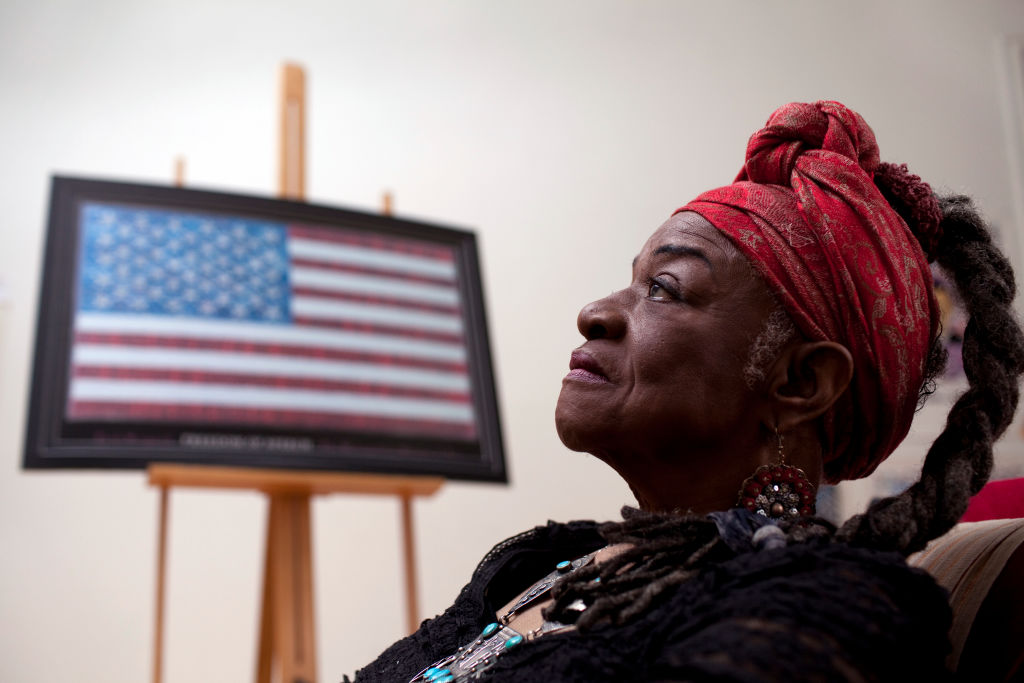
April 14, 2024
Faith Ringgold, Famed Multimedia Artist, Dies At 93
In addition to her quilts, Ringgold used painting, sculpture, masks, dolls, textiles, and performance art to explore race, gender, class, family, and community related themes in her art.
Faith Ringgold, a multimedia artist whose canvas was often a quilt exploring the tapestry of Black American life, passed away at the age of 93 on April 13 at her New Jersey home. In addition to her quilts, Ringgold used painting, sculpture, masks, dolls, textiles, and performance art to explore race, gender, class, family, and community-related themes in her art.
As the New York Times reports, Ringgold’s death was confirmed to the outlet by her daughter, Barbara Wallace. Ringgold was a classically trained painter and sculptor who began her career in the arts by painting political works exploring subjects like race and gender relations in America during the 1960s and ’70s.
Although her work received praise right from the beginning of her career, she did not receive placement in the country’s most prestigious art museums until well into her career, something Ringgold regarded as a consequence of both her commitment to exploring themes of social justice through her art and the intersection of her race and gender.
Ringgold, however, believed that art was for everyone and should be accessible to everyone. As she told the Orlando Sentinel in 1992, “In a world where having the power to express oneself or to do something is limited to a very few, art appeared to me to be an area where anyone could do that. Of course, I didn’t realize at the time that you could do it and not have anyone know you were doing it.”
One of her most acclaimed “story quilts” was a piece she called “Tar Beach,” which she finished in 1988. That piece led Ringgold to create a children’s book by the same name in 1991. In symmetry with the quilt, the book tells the story of a Black family picnicking and sleeping on the roof of their Harlem apartment on a hot summer night.
Tar Beach was named a Caldecott Honor Book by the American Library Association, became a staple of children’s reading lives, and picked up a Coretta Scott King Award, awarded by the ALA to books depicting Black American life for children or teenagers with distinction.
Ringgold’s early art style drew inspiration from James Baldwin and Amiri Baraka, African art, and the jazz rhythms of Duke Ellington and other musicians she listened to as a young child. She even led protests, first focusing on the marginalization of Black artists, held at the Whitney Museum of American Art in New York in 1968. In 1970, Ringgold helped organize another protest, this one focusing on the exclusion of women artists, which occurred at the Museum of Modern Art. During this decade, Ringgold’s work took on a more overtly feminist tone.
In 1980, Ringgold produced her first full-sized quilt alongside her mother, titled “Echoes of Harlem.” “I think of quilts as the classic art form of Black people in America,” Ringgold told The Morning Call in 2005. “When African slaves came to America, they couldn’t do their sculpture anymore. They were divorced from their religion. So they would take scraps of fabric and make them into coverlets for the master and for themselves.”
Over the next 40 years, Ringgold’s work would be collected and acquired by private art collectors, the late Maya Angelou and Oprah Winfrey among the most prominent. Ringgold’s work also eventually found its way into prominent museums like the National Museum of Women in the Arts and was commissioned for public spaces, both physically and digitally. In 2022, Ringgold’s work received a retrospective at the New Museum in Manhattan.
That show, which filled three stories, prompted critic Holland Cotter to write in his review for the New York Times that he believed the acceptance of Ringgold’s work represented a full circle moment for the artist. Cotter wrote that the exhibition “makes clear that what consigned Ringgold to an outlier track half a century ago puts her front and center now.”
Ringgold is survived by her daughters, Barbara and Michelle Wallace, a prominent feminist writer and cultural critic, three grandchildren, and three great-grandchildren. Her husband, Burdette Ringgold, preceded her in death in 2020.
RELATED CONTENT: How Faith Ringgold Carried On The #HarlemRenaissance Through Her Art